The inventors of the game are finally finding their feet in it. After years of disappointment and abject failure, England can now actually eye world glory by officially being ranked the world’s numero uno team in all the three formats of the game, i.e. Test matches, ODIs and Twenty20 cricket. The groundwork for it has been done by ‘A Few Good Men’, who sweated, strived and struggled over the years in order to try to make England atleast a competitive side in the world of cricket, if not a dominant team. Here are those cricketers and how they did it –
1) Duncan Fletcher and Nasser Hussain
Fletcher became England’s coach right after the national side’s disastrous home summer of 1999 which saw them knocked out of the World Cup in the first round itself, followed by which they lost a Test series to the bottom ranked New Zealand side despite being 1-0 up in the series. His appointment as coach was not taken too well in many quarters, since he had no coaching experience in the past and was not a familiar name across the world. Even as he created history by being the first ever captain of Zimbabwe in international cricket, winning them the ICC Trophy in 1982 and a year later, a famous ODI game against Australia in the World Cup in England where he was named man of the match for his all round performance.
He had to work with the Chennai born Nasser Hussain, who was appointed captain of England at pretty much the same time when he was appointed as coach. Fletcher was more conservative in his thinking while Hussain seemed to be more liberal which was a sharp contrast of attitudes between captain and coach. Yet, they were united in their cause of England being able to perform to the best of their abilities and giving champion teams a run for their money.
Under Fletcher, England for the first time played extremely well away from home in Test cricket. In South Africa, the young man Michael Vaughan was sent up the order when England were struggling at 2/4 in the second innings at Cape Town. England lost the series 1-2, but South Africa were challenged from a team barring Australia at home.
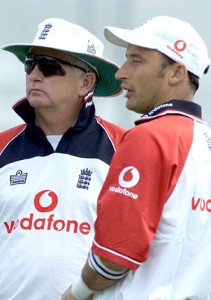
Pakistan were beaten in a Test match in Karachi in the winter of 2000, in the famous Test match where Graham Thorpe hit the winning runs in the dusk which was beckoning at the National Stadium. That gave England the series 1-0. In Sri Lanka the following year, England were 0-1 down but Thorpe again was instrumental in helping England win 2-1, even as some umpiring decisions were controversial and hurt badly the home team’s chances of winning.
Whereas in December 2001, England toured India without some of their key players such as Andy Caddick. Yet, they managed to hold a team like India in their own backyard to two draws in three Tests, even as Hussain came under controversy for setting negative fields for the master Sachin Tendulkar in a Test match in Bangalore. England lost 0-1, but Hussain was able to inspire England and not discourage them despite losing which is an admirable quality of any leader in the field of sport.
Hussain was enamored by one of the members of the team management, who had a sharp business mind and used all his experience from the business world to apply it in cricket. The manager insisted on England having the best of resources, which made Hussain ensure that his teammates give it their best whenever they took the field. England was developing as the dark horses of world cricket under Hussain, while Fletcher took it upon himself to groom the youngsters such as Vaughan, Flintoff and Harmison who would go on to become an integral part of the team in the years to come.
England’s Test form was consistent, even as they succumbed to Australia again at home in mid 2001, losing 1-3 in 5 Tests and losing 1-4 in 5 Tests in Australia in the 2002-03 season, where the contest for the Ashes ended in 11 days time. When things were going downhill for England again especially after another disastrous World Cup campaign which was the one in South Africa in 2003, Hussain quit Test and ODI captaincy and handed it over to Michael Vaughan in the summer of the same year.
But it was due to Hussain that England became more aggressive in their approach and believed that they could win anywhere against any team in the world, and Michael Vaughan only developed the team further alongside Fletcher who continued to be a permanent fixture in the England team as its coach.
2) Michael Vaughan
Once Vaughan took over the captaincy, he encouraged more youngsters to become regulars in the national side in all formats of the game. Fletcher continued to work efficiently behind the scenes, while Vaughan began his march to become perhaps England’s greatest Test captain of all time. In his first Test series in charge, he took over in the middle of the series and still managed to help England draw level 2-2 with a powerful South African team at home in the summer of 2003. Before that, England beat South Africa in a triseries final at Lords to win the annual home ODI tournament which was much unexpected of a team which plays Test cricket any day better.
England proceeded to have a fabulous 2004 which saw them winning eight consecutive Test matches in a row. In the Caribbean, Vaughan and co. beat West Indies in three out of the four matches in the series despite it being remembered more for Brian Lara hitting a world record 400 not out in the final Test match at Antigua instead of Steve Harmison wrecking the West Indies batting line up in the first Test match at Jamaica where he bowled one of the monstrous spells of the longest format of the game, picking up 7/12 and singlehandedly bowling the home side out for 47. But this was the beginning of the foundation of England becoming a powerhouse of Test cricket, with an efficient pace attack comprising of Matthew Hoggard, Steve Harmison, Simon Jones and Andrew Flintoff.
Then at home, they were unbeaten throughout the summer as Andrew Strauss began the run in style with a debut hundred at Lords, his home ground and the home of cricket. New Zealand were whitewashed and the same result was to follow for the West Indies, which was some consolation for English fans who were fed up of the team continuing to underperform in ODI cricket. This was a national record, since none of the English teams had won eight Tests on the trot in the past.
England made it surprisingly to the ICC Champions Trophy final at home, after beating world champions Australia in the semifinal. But they were back to reality as West Indies pulled off an unlikely 2 wicket win in the finale and ended an otherwise miserable summer for them. Yet, Vaughan confidently led his team in South Africa with Fletcher having to play a critical role especially, since he had the experience of those conditions.
The team suffered their first Test defeat since December 2003 in the New Years Test of 2005 at Cape Town (again!). But England dramatically won the 5 match Test series, 2-1 and proved that they always played like a team and not individuals. A win in South Africa was the first by any team after Australia since 1992, which was a major plus point in Vaughan’s captaincy career. A great 2004 and the first half of 2005 gave England a slight belief that they could beat Australia in the magnum opus Ashes 2005 at home.
They did so, winning by the 2-1 margin as this was undoubtedly the finest Test series of all time. Kevin Pietersen made a stunning Test debut, following his ODI exploits in South Africa and Andrew Flintoff became the toast of the nation, as the team made cricket and not football the most watched sport in the country for a while. In the home ODIs, England had a mixed run as they shared the triangular series trophy with Australia, but lost to the same team 1-2 in a three match series.
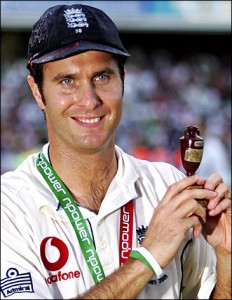
But ironically, it was the Ashes which marked the beginning of the ashes of Vaughan’s captaincy and playing career. He suffered from a spat of injuries which took him out of the team for close to 18 months and England’s downfall consequently began. Fletcher could do nothing much, as Andrew Flintoff became a depressed soul despite being the captain of England. The entire team’s morale was shattered, which proved Vaughan’s value in the side. The demons of 2002-03 were back again in 2006-07, as England lost the Ashes back to Australia 0-5 in Australia. Even as the team tasted rare one day success away from home, winning the triangular series trophy in Australia.
But Vaughan became the first England captain to win 22 Tests following England’s series win against the West Indies at home in May 2007. Fletcher’s resignation as coach only meant that he had a tough task in hand to once again rebuild England’s team. Vaughan had quit ODI cricket after the 2007 World Cup, so he only had to play and lead England in Tests. Still, he had lost his charm as India upset England 1-0 in England in a 3 match Test series whereas Sri Lanka won 1-0 in 2 Tests in Sri Lanka.
An underperforming New Zealand side thrashed England in the first of the three matches in New Zealand in March 2008 and it prompted Vaughan to remove Steve Harmison and Matthew Hoggard from the team, which was actually a blessing in disguise as England fought back to win the series 2-1. But Vaughan’s captaincy career was over when South Africa won two of the first three Tests in the summer of 2008, and Kevin Pietersen succeeded him. This proved to be his last outing for the national side as well, as after a year of poor form in domestic cricket, he quit all forms of the game.
But Vaughan’s legacy will remain as he was the one to make England a heavyweight Test match team and it was under him that the likes of Andrew Strauss, Kevin Pietersen and Stuart Broad made their debuts and flourished into the players that they are today.
3) Andrew Strauss and Andy Flower
Andrew Strauss has been a revelation for England ever since his memorable Test debut at Lords in 2004 against New Zealand. That innings was so crucial, that it would change the team’s Test fortunes in the long run. He replaced Michael Vaughan at the top of the order and that made pile on runs and runs in different conditions. At one point, he was the World’s No.1 Test batsman as per the ICC rankings.
He briefly captained England for a few home matches in the summer of 2006, but Andrew Flintoff snatched back the captaincy from him. With that, Strauss was already touted to be England’s future skipper on a permanent basis even as he had only a few years of experience in international cricket at the time. But in ODI cricket, his struggles were a reflection of that of the team’s and had to work hard to cement his place in this format of the game.
But Strauss suffered from a massive dip of form in the 2007-08 season and was actually dropped for several matches featuring the national side, until he made a match winning double century batting at No.4 in a Test match in New Zealand in March 2008. And once Kevin Pietersen’s short lived captaincy tenure came to an abrupt end, he was appointed captain in the ODIs and Tests formats for England and it all began on the tour of West Indies.
At the same time coincidentally, Andy Flower was appointed as England’s coach following his predecessor Peter Moores’ public fall out with Kevin Pietersen. Another Zimbabwean legend had come to the top position of the English team. Many were skeptical about his appointment since they only knew of Flower as a batting champion from the African nation, who had worn black armbands in the World Cup 2003 to bravely protest the then President Robert Mugabe’s regime and was one of the best players of spin in the world. Yet, this was his first coaching assignment with any team.
But this was the beginning of a new era for England. Following the 0-1 loss in 5 Tests in the Caribbean and their narrow 3-2 win in the ODIs, they targeted the home summer for their revival first. West Indies were beaten outright in both the formats and Strauss became the second captain after Michael Vaughan to win an Ashes in the 2000s for England as the team repeated history by winning 2-1 against the world champions, who were this time struggling even before the series began.
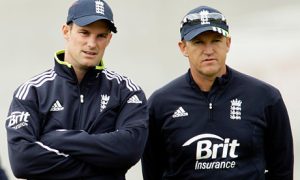
During this period, Kevin Pietersen suffered a rare lean patch but England still managed to have a successful winter in South Africa, as they made it to the last four of the ICC Champions Trophy which was another rare one day success, putting aside the disappointment of losing 1-6 in 7 ODIs at home to Australia after the Ashes. In the ODIs in South Africa against the hosts, England won 2-1 in a 5 match series in which the visitors surprisingly dominated. While in the Tests, out of nowhere, England managed to draw level 1-1 in 4 matches. Paul Collingwood, Ian Bell and the No.11 Graham Onions were the key in enforcing the draws especially as England survived with 1 wicket to spare.
England showed the resilience and the skill they had as a team that year itself to become No.1 soon. India and South Africa were also on the surge, but that did not let their hopes down. In Bangladesh in March 2010, the team won all their matches without the likes of Strauss, Anderson and other key players. Bangladesh suffered a similar fate in England, except winning one ODI surprisingly at Trent Bridge. Pakistan followed next, and England won convincingly 3-1 even as the final Test at Lords will go down as a scourge in the modern game due to the spot fixing activities by three Pakistani players. The ODIs were also won 3-2, which ended a fine home season for England.
Strauss however, had an uphill task of leading England in Australia in December 2010. But the team stood up to the challenge and Andy Flower’s methodical approach towards coaching helped the team be united and motivated to rise up to perform when it mattered the most. Australia were beaten 3-1, with all three wins for England being by an innings margin, ensuring that the team won the Ashes after 25 years in Australia. Hence, the team proved that they were no home performers but could play equally well away from home.
Another home season was the solace Strauss needed after he decided to quit ODI cricket after a disastrous 2011 World Cup campaign in the Indian subcontinent. England managed to beat Sri Lanka 1-0 in 3 Tests, but the ultimate icing on the cake was to defeat the World No.1 Indian team 4-0 in 4 Tests in the latter part of the summer of 2011, which confirmed England as the new No.1 team in Test cricket. They played like a team and never let India off the hook, even at key stages of the match. Both these series wins meant that England had not lost a single series at home since the 2008 Test series to South Africa, and all of them were under Strauss’ leadership.
However, the lowest point of Strauss as England captain came when the team were whitewashed by Pakistan 0-3 in 3 Tests in the United Arab Emirates in January 2012. He has been ever since, under tremendous pressure since his batting form has alarmingly dipped since the 2010 Ashes series. He managed to hit two fifties in three Tests in Sri Lanka in April 2012, and England managed to square the 3 match series 1-1.
There are tough times ahead for England under Strauss when South Africa again come to conquer England and become the No.1 team in the world, followed by which in the winter season, Strauss in all probability will lead the team in India for 4 Test matches. It remains to be seen if Strauss, with the help of coach Andy Flower will ensure that England become the West Indies of the 80s or the Australia of the 2000s in Test cricket. But he will go down as the second greatest Test captain for England after Michael Vaughan.
Andy Flower though, has turned England’s fortunes big time. He helped England reach the No.1 spot not only in Tests, but also in T20 cricket as the team won the World Cup in the Caribbean in May 2010. After the Test series against India last year, he was awarded the Best Coach of the Year in England which is a massive honour and ofcourse the MBE. As long as Flower is the coach, England will continue to play as a united force in any conditions.
4) Kevin Pietersen
This man has definitely helped England reach to where it is today. Although he retired prematurely from ODIS and T20s, it is actually due to his batting that England are the best in T20 cricket at the moment. In ODIs, England recently won all the four matches in the United Arab Emirates against Pakistan mainly due to Pietersen opening the batting. He has helped England taste ODI success at times, when their focus has been on Test cricket.
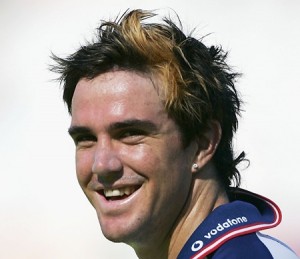
His attacking and fearless style of batting was seen first in his home country, South Africa in February 2005 which won him many admirers. And his first Test series was equally spectacular against Australia at home, where he was the key in the side’s win. Pietersen is that un English batsman, who defies typical English batsmanship which involves not taking too many risks especially at the start of the innings. He has been an inspiration for the new generation of batsmen to attack more, and the results would be evident when England become No.1 in all formats of the game.
His major contributions also involve leading England with the bat in the World T20 2010 winning campaign and the Adelaide Test match of the Ashes 2010 where he hit a match winning 227 in the first innings itself, to bat Australia out of the game. He will be sorely missed by England as they have already set their sights for the 2015 World Cup in Australia and defending their World T20 title this year. But he remains a vital cog in England’s middle order in Test cricket.
5) Alastair Cook
Last but not the least is the man who took over Andrew Strauss as England’s ODI captain and in all probability will do the same in Test cricket in the near future. Cook has proved his leadership credentials in the limited opportunities that he has got so far, and has transformed himself into a reliable ODI opener for England ever since becoming captain in this format of the game. He alongside Ian Bell have to be responsible for the team’s batting performances, after Pietersen’s retirement.
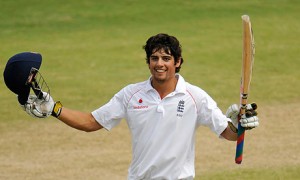
While in Test cricket, he has been someone England relies heavily at the top of the order ever since he made a debut hundred against India at Nagpur in March 2006. Cook has played some outstanding knocks which involve a match saving 235 against Australia in Brisbane in the Ashes 2010 and a 297 against India at Trent Bridge in 2011, which helped England seal the series against the the world champions. He has had lean patches, notably in the 2010 home season against Bangladesh and Pakistan, but with Strauss, he is any opposition’s No.1 enemy and a prizedwicket.
Cook has more responsibilities ahead of him in Tests and ODIs, as he will have to work in tandem well enough with Flower, who is likely to stay as England coach for a long period of time. While in T20s, Stuart Broad will have to lead a team extremely well without Kevin Pietersen and Paul Collingwood. If England do beat Australia 5-0, they will become No.1 in all three formats for the next month and a half at least. But the celebrations could be short lived if South Africa beat them in the upcoming Test series or if they are unable to make it beyond the Super 8s round in the World T20 this year in Sri Lanka. Besides, Australia is too strong minded to get bogged down with two consecutive defeats and will do anything to bounce back in the series.
Yet England is on the verge of creating history, and a nation which is disappointed with their team’s quarterfinal exit from the Euro 2012 in football, might again want to follow cricket as this team is performing much better at the moment.

Leave a Reply